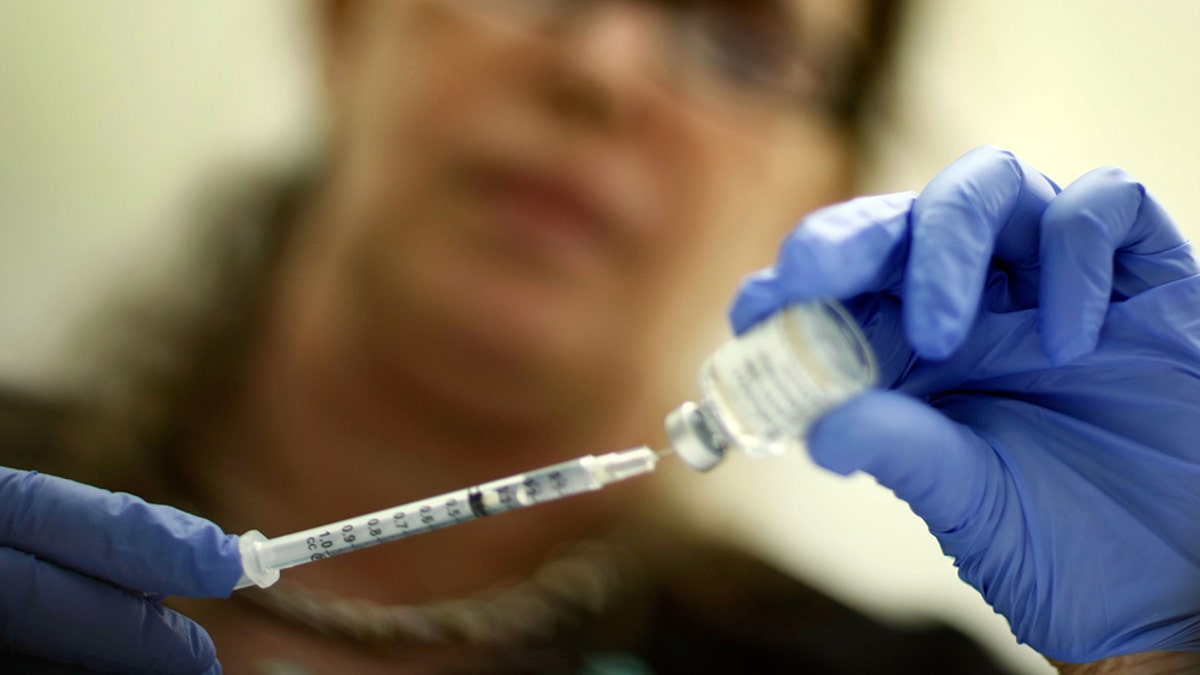
MIAMI - NOVEMBER 03: Marina Spelzini, a registered nurse, measures out an H1N1 vaccine shot at the Miami Dade County Health Department downtown clinic on November 3, 2009 in Miami, Florida. Unlike other parts of the country which are experiencing long lines and shortages of the vaccine, South Florida is not having this problem. The Miami-Dade County Health Department received 195,000 doses of the vaccine but has only given out about 10,100. Broward County has 52,000 doses on hand and has administered about 10,000 doses. (Photo by Joe Raedle/Getty Images) (2009 Getty Images)
A new study further eases fears that the rotavirus vaccine might increase the risk of blocked bowels in infants -- a concern that led to an earlier version of the vaccine being pulled from the market in the United States.
In the report on close to 800,000 doses of the vaccine, which protects against severe diarrhea, vaccinated babies were no more likely to end up in the hospital or emergency room with so-called intussusception -- when one part of the intestine slides inside another like a telescope.
The findings jibe with a recent report that found that hospitalizations for the intestinal problem didn't significantly increase in babies after rotavirus vaccination became routine in 2007 (see Reuters Health story of January 5, 2012).
"We can't rule out that a low-level risk could exist," said researcher Irene Shui, from Harvard Medical School in Boston.
But, "our results do add to the message that even if there was a low-level risk of intussusception, the benefits of the vaccine far outweigh those risks," Shui told Reuters Health.
The initial version of the rotavirus vaccine was introduced in the U.S. in 1998 and pulled the next year following increased reports of intussusception. The thinking was that the vaccine, a weakened dose of the live virus, might occasionally stimulate an immune response in the intestinal tract and change its shape.
Two newer vaccines, taken orally, didn't increase those risks during pre-approval testing -- but since have been linked to slightly higher-than-usual reports of bowel problems in Mexican and Australian infants.
To see if that would also apply in the U.S., researchers tracked babies recently given the RotaTeq vaccine, produced by Merck, between 2006 and 2010. They compared cases of intussusception in those infants to babies who didn't get the rotavirus vaccine during that time, and to intussusception hospitalizations in 2001 to 2005, before the vaccine was re-introduced -- and found no differences.
In the first month after babies received any of the 787,000 vaccinations, there were 21 cases of intussusception, compared to the 20.9 that would have been expected with no vaccine, based on past records. And after 310,000 first doses of the vaccine, there were seven cases in the next month, compared to the predicted 5.7 cases.
Both of those small differences could have been due to chance, Shui's team reported in the Journal of the American Medical Association on Tuesday.
There were similar numbers of bowel problems in babies who did and didn't get the rotavirus vaccine in the late 2000's -- but there were so few cases in either group that it was hard to compare specific situations, such as the risk of intussusception in the first week after a first vaccine dose.
The study was funded by the Centers for Disease Control and Prevention. One of the authors reported receiving research support from Merck in the study's conflicts of interest disclosure.
The researchers said their results can't rule out the possibility that a slightly increased risk would show up among a bigger sample of vaccinated babies.
"I think it's important for both parents and physicians to realize that vaccines like the rotavirus vaccine have had a tremendous public health benefit, but every treatment or vaccine has some risk," Shui said.
She said that the rotavirus vaccine has prevented up to 50,000 diarrhea hospitalizations each year in the U.S. If there was a small risk of intussusception, similar to that shown in other countries, it would translate to 40 to 60 extra cases of the bowel problem annually.
Dr. Joseph Zickafoose, a pediatrics and communicable diseases researcher at the University of Michigan in Ann Arbor and one of the authors of the earlier study, called the findings "very encouraging" and agreed that the balance of harms and benefits strongly favors vaccination.
The new study, he told Reuters Health, "should reassure families that the rotavirus vaccine is safe and that the benefits of preventing severe illness and ending up in the hospital outweigh any risks, which we don't seem to be finding."
